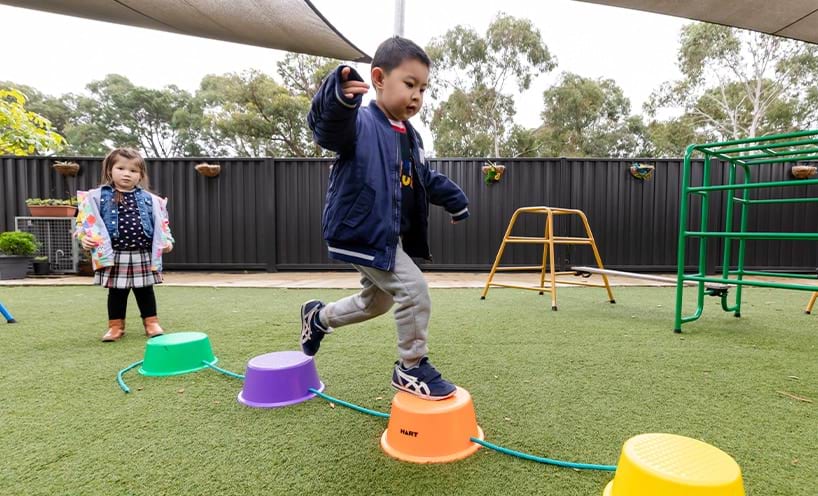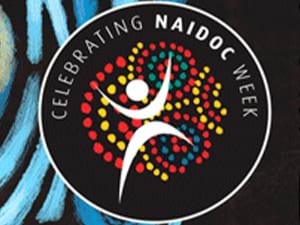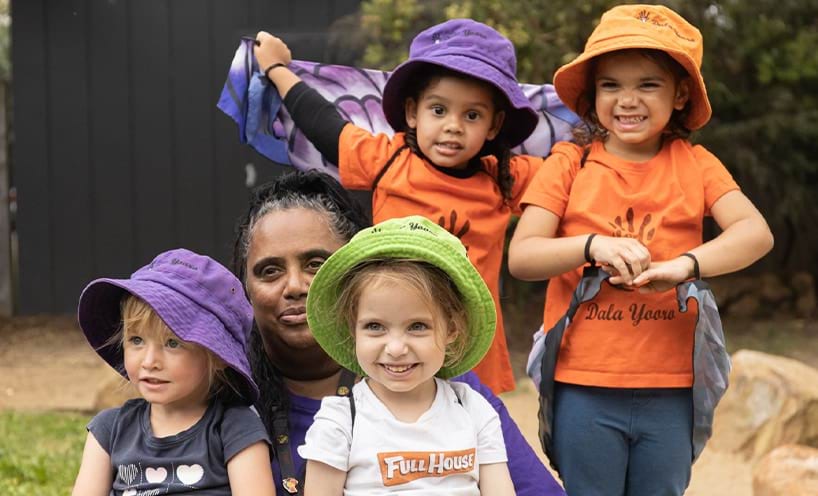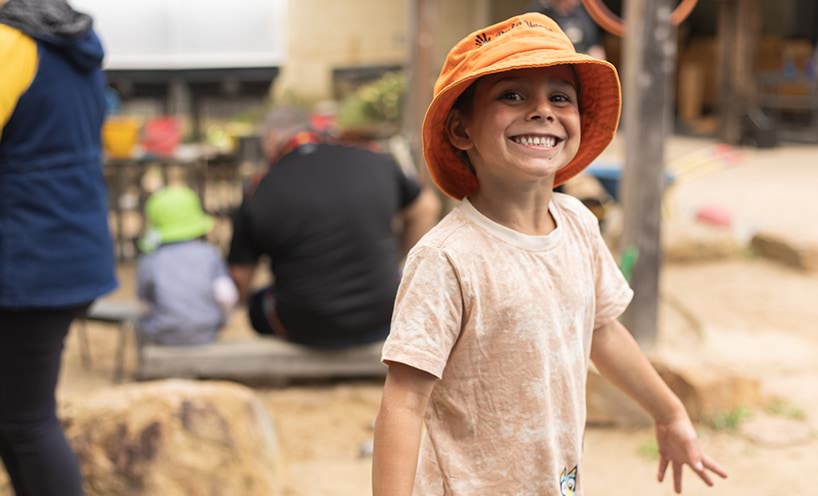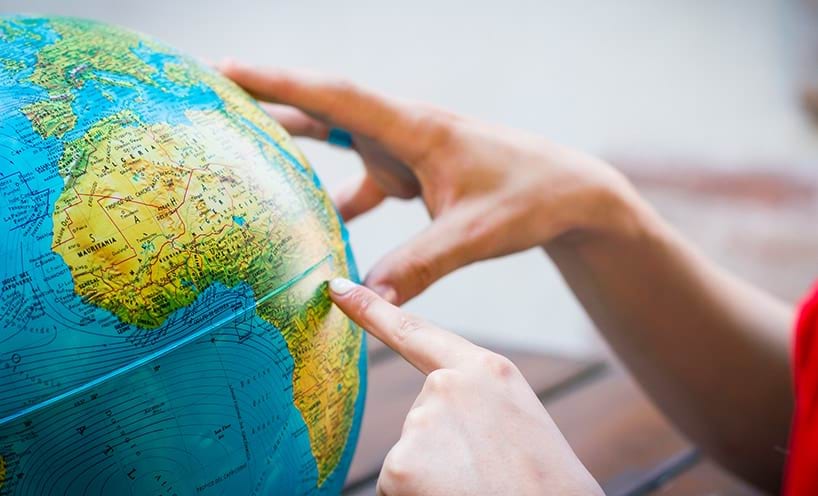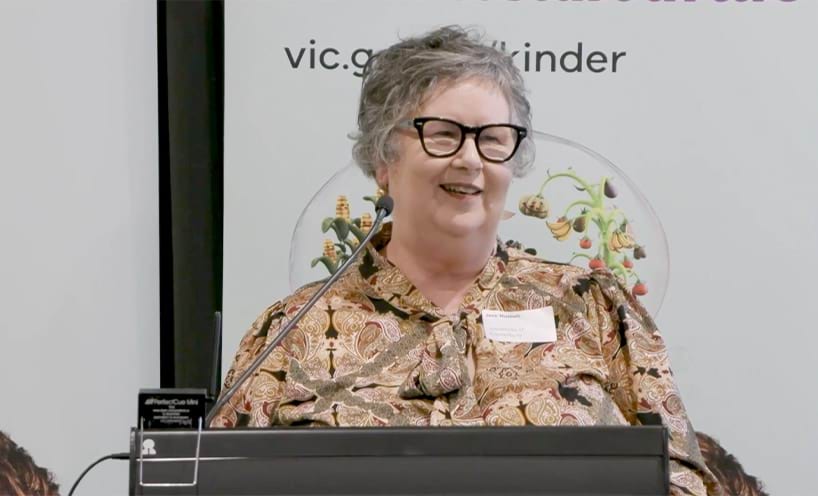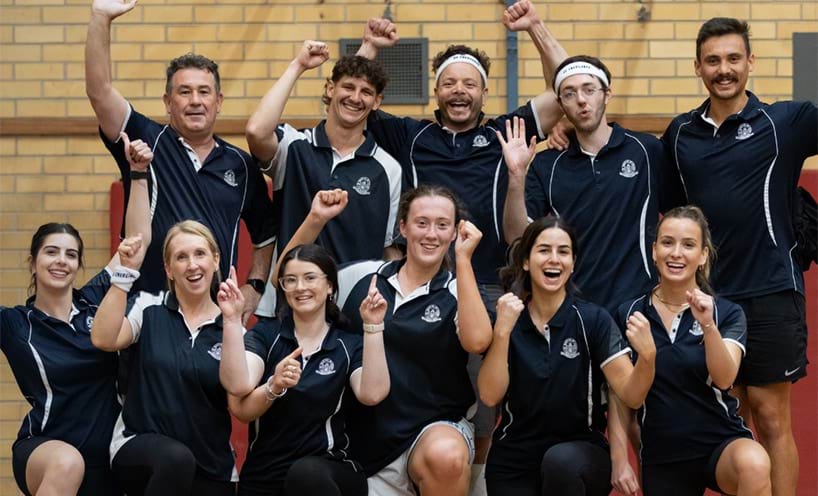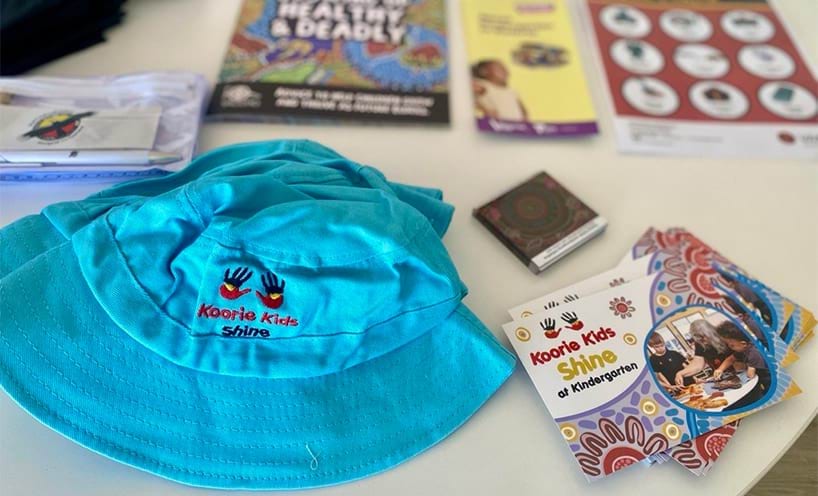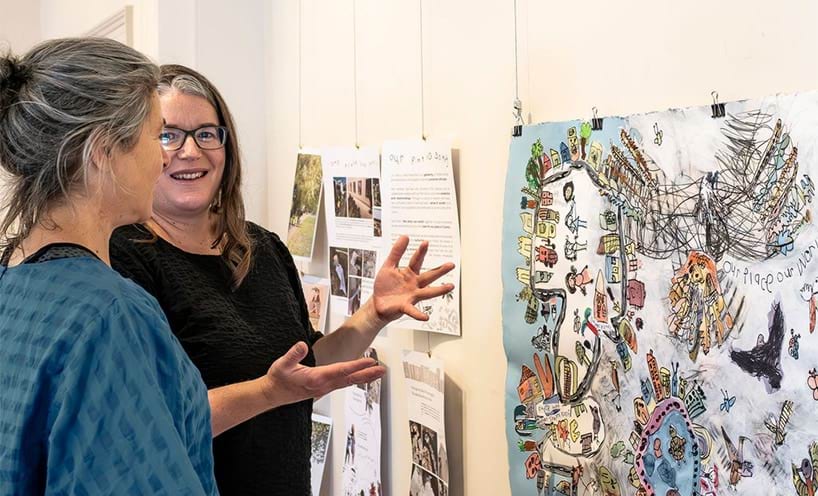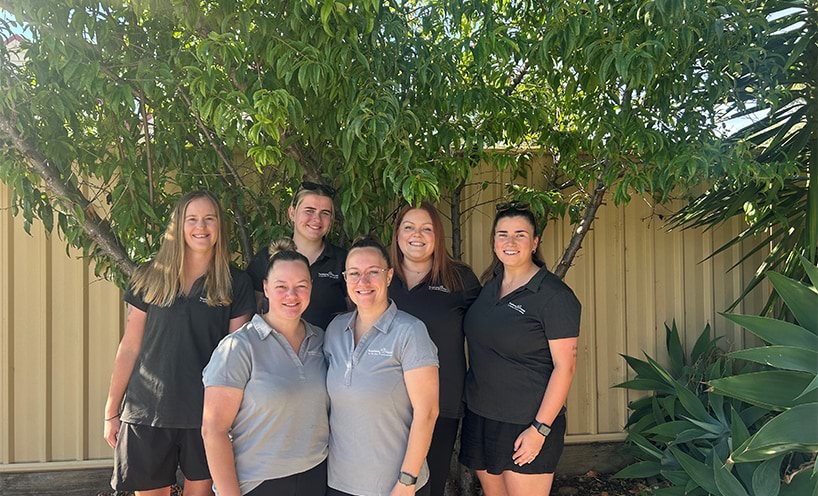- Published by:
- Department of Education
- Date:
- 5 June 2025
The Early Childhood Update e-newsletter is sent to early childhood teachers and workers, but is open to anyone interested in best practice in early years education and evidence-based teaching approaches. Subscribe here to receive the e-newsletter(opens in a new window).
Victorian State Budget continues to invest in early childhood education
Reaffirming the commitment to give every Victorian child the best start in life.
Dear colleagues
As I shared with you last month, the 2025/26 Victorian Budget delivers nearly $2 billion for the Best Start, Best Life reforms, demonstrating the Victorian Government’s commitment to early childhood education.
The Budget figures tell the story of future investment, but it’s also useful to think about how these figures translate in the real world. Updated statistics about last year’s kindergarten programs are now available and they paint a striking picture.
In 2024:
- more than 143,000 children benefitted from Free Kinder
- 96% of eligible children attended Four-Year-Old Kindergarten, the highest rate since 2016
- 88% of services offered 15 hours a week of Three-Year-Old Kindergarten, well ahead of schedule.
On the infrastructure side, this year we’ve opened:
- 20 kindergartens on government school sites
- 45 kindergartens on local government and other provider sites
- 4 early learning and childcare centres, operated by Early Learning Victoria.
The investments from this year’s Budget will help us work together to build on these achievements, to support more children and families to access more hours of play-based learning.
Supporting First Nations access and reflecting on Reconciliation Week
This year’s Budget also invests $5.3 million in Aboriginal Community Controlled Organisations (ACCOs) with kindergarten programs. This is vital funding that will provide certainty and flexibility through a single per-child funding stream. This investment enables these organisations to deliver tailored programs – improving outcomes and advancing self-determination.
This update edition comes to you at the conclusion of National Reconciliation Week (Tuesday 27 May to Tuesday 3 June 2025).
This year’s theme was ‘Bridging now to next’, which encouraged reflections on the lessons learned from the journey to Reconciliation so far.
One of the initiatives making a big difference for First Nations families in Victoria is Koorie Kids Shine. Launched in 2015, the program has contributed to high levels of participation of Aboriginal and Torres Strait Islander children in Three- and Four-Year-Old Kindergarten.
Throughout the state, there are great examples of creative, effective approaches to support inclusion and participation. In this edition, you can read how the Wathaurong Aboriginal Co-operative in the Barwon Region is supporting Koorie families in their transition to kindergarten.
First Nations children are also being prioritised to access Pre-Prep. In 2026, Victorian children who identify as Aboriginal or Torres Strait Islander will be able to access up to 25 hours of kinder programs each week, no matter where they live in the state.
There is still more work to do and more opportunities to reflect as a sector on how we can do our best for First Nations children and their families. I look forward to continuing our work together to help Victorian children to learn and thrive.
Bronwen FitzGerald
Deputy Secretary
Early Childhood Education
Using Arrival to support attendance
The new purpose-built system includes functionality to enable sessional services to collect and report attendance data.
Arrival is the new mandatory kindergarten reporting system. All funded kindergarten services now have access to Arrival.
The collection and reporting of attendance data for sessional services via Arrival has started. In May, all services received an email update about digital attendance collection through Arrival.
All services transitioning from paper-based collection to using Arrival for their ‘sign in and sign out’ process have received an email with their commencement date and next steps.
Services using third party software providers have received targeted information and guidance about attendance data integration with Arrival.
For more information, view our frequently asked questions.
Digital sign in and sign out – information and drop-in sessions
We are continuing to offer information sessions and online drop-in opportunities throughout June to further support the implementation of digital sign in and sign out. Register for an upcoming session here.
Guidance and support
Guidance and support for using Arrival sign in and sign out functionality is available through the ‘Help’ link at the top right-hand corner of your Arrival system screen.
Additional information and resources to support engaging families with using Arrival for sign in, sign out are available on the Arrival(opens in a new window) webpages.
Find out more
For technical support when using the system, contact the Arrival Helpdesk:
For further enquiries about accessing Arrival, contact the Arrival Implementation team by email: arrival.implementation@education.vic.gov.au(opens in a new window)
Planning for emergencies in early education services
Review your Emergency Management Plan in preparation for the high-risk weather season in 2025-26.
Every approved early childhood service must have procedures in place for emergencies to ensure the safety of children and staff on site. These must be reviewed at least annually and practiced every 3 months.
Winter is the perfect time to review and update your facility's Emergency Management Plan in preparation for the high-risk weather season in 2025-26.
Templates and guides are available on the department’s website.
Your plan must assess and consider mitigations and procedures for emergencies and critical incidents, including:
- heatwave
- pandemic
- medical incident such as anaphylaxis or asthma attack
- severe weather
- loss of essential services
- death or serious illness
- missing child
- gas leak
- aggressive person or intruder.
Assessing and managing bushfire risk in early childhood services
Victoria is one of the most fire-prone areas in the world. The Victorian Climate Science Report 2024 states bushfires have become more frequent and severe, and burn larger areas.
To ensure the safety of students, children and staff on site, we work with the Commonwealth Scientific and Industrial Research Organisation (CSIRO) to assess all early childhood education and school sites annually for bushfire risk, using the most up to date scientific information.
We are currently reviewing all services for bushfire risk for 2025-26.
Services at risk of bushfire or grassfire
Some early childhood services are at higher risk of bushfire or grassfire because of their location.
Services assessed as being at the highest risk of bushfire are placed on the Bushfire-at-risk register (BARR) (Categories 0, 1,2 and 3).
Services assessed as being at some risk of bushfire or grassfire are listed as Category 4.
Services categorised as 5 or 6 are not considered to be at significant bushfire risk.
Family day care services are not placed on the BARR or the Category 4 list.
Actions for approved providers
All approved providers should:
- check your service approval conditions
- review your Emergency Management Plan
- check your rating on the BARR and Category 4 list in July 2025, following the review. If your service does not appear, you are likely considered low risk. New services may not yet appear online, so always follow your service approval conditions
- download the Vic Emergency app, set up a watch zone around your service and monitor for local incidents, forecasts and warnings
- familiarise yourself with how to monitor the fire danger rating in your area, through the Country Fire Authority Total Fire Bans and Fire Danger Ratings webpage
- familiarise your families and local community with your emergency procedures and any triggers for closure
- ensure that your service approval shows your correct address including the street number so that the correct site can be included in the department’s bushfire risk assessment.
Remember not to publish your full Emergency Management Plan on your public facing website. These plans can contain sensitive information, such as staff contact details. Be sure to socialise only relevant aspects of your plan with your families and key contacts.
Sign up for a webinar
You can join a webinar in August to learn more about emergency management planning in early childhood facilities and the outlook for the 2025-26 high-risk weather season.
Sessions are:
- Tuesday 5 August 2025, 10:30 am to midday. Register here.
- Tuesday 5 August 2025, 2:30 pm to 4 pm. Register here.
- Wednesday 6 August 2025, 10:30 am to midday. Register here.
- Wednesday 6 August 2025, 2:30 pm to 4 pm. Register here.
Find out more
For more information, visit the Emergency management in early childhood services and Managing bushfire and grassfire risk in early childhood services webpages.
For further emergency management queries, contact the Security and Emergency Management Division by email: emergency.management@education.vic.gov.au
For queries relating to service approval conditions, contact the Quality Assessment and Regulation Division by email: licensed.childrens.services@education.vic.gov.au
Information-sharing training and how to access Child Link
New eLearns are available to further support your understanding of the information-sharing reforms and how to access Child Link.
New training options and updated resources are available to help you continue to embed the Information Sharing and Family Violence Reforms and Child Link at your service.
These resources respond to feedback from stakeholders requesting targeted guidance, and support services to continue sharing information confidently, safely and appropriately.
New eLearns and guidance
We have developed a series of free and innovative eLearns to help you learn more about your responsibilities and obligations under the Child Information Sharing Scheme (CISS) and the Family Violence Information Sharing Scheme (FVISS). There is also an eLearn for Child Link users and authorisers.
To access the new eLearns for education professionals, or the existing webinar training options, refer to Training for the information sharing and MARAM reforms. This provides links for both information sharing training and compulsory Child Link training.
Funding is available to support early childhood teachers who would like to attend the webinars. For more information, email: CISandFVIS@education.vic.gov.au
In addition to the new eLearns, the updated Information Sharing and Family Violence Reforms – Guidance and Tools are designed to support the education, health, wellbeing and inclusion workforce.
About CISS and Child Link
CISS makes it easier for early childhood professionals to request and share information with other organisations to promote the wellbeing and safety of children.
The Child Link system is a digital tool that displays information about a child and their participation in key early childhood and education services. Child Link is a key enabler of the CISS.
Both Child Link and CISS are designed to enhance the valuable work early childhood providers already do to promote children’s wellbeing and safety by supporting professionals to see the full picture. Together, CISS and Child Link can support you to:
- make more informed decisions about the wellbeing, safety, and support needs of a child in your service
- better identify risks and vulnerabilities and provide support to prevent any escalation of harm
- encourage cross-service collaboration to facilitate more holistic support around a child
- provide support earlier by linking together information from across schools and services
- facilitate smoother transitions between early childhood and education services by responding to gaps in participation.
Early childhood providers can nominate up to 3 Victorian Institute of Teaching registered teachers as Child Link users for each service.
For more information about Child Link and how to access it, refer to Child Link for Early Childhood Providers.
Find out more
For more information, refer to:
- Information Sharing and Family Violence Reforms – Guidance and Tools
- Child Link for Early Childhood Providers
- Child Information Sharing Scheme.
For further enquiries, contact the Whole of Victorian Government Information Sharing and MARAM Enquiry Line:
- phone: 1800 549 646
- email: CISandFVIS@education.vic.gov.au
International Day of Play
Celebrate the power of play and recognise its role in children’s development and wellbeing, on 11 June 2025.
Wednesday 11 June 2025 marks the second United Nations International Day of Play (IDOP). The day was introduced to raise the global profile of the power of play.
IDOP also advocates for children’s right to play, under Article 31 of the UN Convention on the Rights of the Child. Play is essential for all children’s learning, development and wellbeing.
This year, IDOP is a chance to celebrate our sector’s achievements in providing more children with access to play-based education in their early years.
Local services with a global impact
IDOP was introduced to recognise that not all children around the world have time, opportunity or safe places to play.
We know that early childhood education is making a big difference to children, families and communities in Victoria.
Centring play
The importance of educating children through play is well established in Australia.
The Victorian Early Years Learning and Development Framework refers to play-based learning as integrated teaching and learning approaches, where skilled educators teach by knowing when to guide, lead and step back from children’s play.
In early learning settings, high-quality learning is realised through an intentionally planned interactive process between an educator and children; a child and their peers; and a child and their environment.
When effective educators act intentionally, they make thoughtful decisions in selecting interactional strategies and activities to advance children’s learning. They take deliberate actions about when to directly support learning, guided by children’s interests and underpinning content of the curriculum. They decide when to stand back to give children space and time to explore, experiment and test their ideas.
As more children access additional hours of kindergarten as part of the Best Start, Best Life reforms, it is important to consider how you can centre play in your service delivery model.
For more information about play-based learning, refer to Why play-based learning?
You can also learn more about the power of play in the Children and Young People’s Call to Action. This was informed by feedback from more than 10,000 children and young people around the world. It identifies barriers to play, proposes solutions and recommendations, and reinforces the right of children and young people to have a say in decisions that affect their lives.
Join the global movement to celebrate play on Wednesday 11 June 2025 and every day!
Find out more
For more information, refer to International Day of Play.
Free promotional resources available online
Find out how you can access downloadable and printed materials to display at your service.
The Victorian Kindergarten Resources portal is your one-stop-shop for resources to promote kindergarten programs in Victoria.
If you’re looking for posters, postcards, flyers or brochures to display at your service, or translated information for your community, you can find them on the portal.
You can also access resources with information about becoming a kinder teacher, factsheets about Free Kinder in both a sessional and long day care setting, and Kinder Tick signage.
You can download and print resources related to Best Start, Best Life, display them on site or share them with families to help them learn about kindergarten in Victoria.
You can also order resources for the following categories:
- Three- and Four-Year-Old Kindergarten
- Pre-Prep
- recruitment
- Early Start Kindergarten
- Koorie Kids Shine
- Kinder Tick (including signage)
- translated resources in over 15 languages to support families to enrol in kindergarten.
The cost for printing and delivery is paid by the department.
Visit the Victorian Kindergarten Resources portal to create an account and start accessing free materials to display at your service.
Find out more
For more information, please contact the department by email: ec.portfolio.communications@education.vic.gov.au
Catch up on the most recent Best Start, Best Life Evening Leadership Series event
Hear from Professor Joce Nuttall and early childhood leaders from across the state on how to manage change.
The Best Start, Best Life (BSBL) Evening Leadership Series(opens in a new window) supports Victoria’s early childhood service and organisational leaders in their continued implementation of the Best Start, Best Life reforms.
If you missed the third event in the series, Leading Change Together, you can watch the video recording at the end of this article.
Embracing change
This inspiring session brought together early childhood leaders from across Victoria to share insights, reflections and practical strategies for managing change through the Best Start, Best Life reforms.
The event featured keynote speaker Professor Joce Nuttall, Executive Dean of the Faculty of Education at the University of Canterbury in Christchurch, New Zealand. Professor Nuttall has more than 40 years' experience as a leader, educator and researcher in primary and early childhood education settings.
Her presentation, Implementing the BSBL reforms: the role of centre leaders, encouraged attendees to think about practice change and what leaders can do to foster effective change.
Professor Nuttall helped develop the Change Management Toolkit(opens in a new window), which assists early childhood leaders to plan and implement change that is right for their service and community.
A different way of doing
The event also featured an opening address from the Parliamentary Secretary for Children, Hon. Nathan Lambert, an update from the Deputy Secretary Early Childhood Education, Bronwen FitzGerald, and a panel of experienced service leaders who offered insights and discussion on leading services through change and the Best Start, Best Life reforms.
Panel member Lisa Worland, teacher and educational leader at Mentone Preschool, spoke of how change had been positive for their community kindergarten.
‘We approached change with real positivity, and we learnt very quickly that change or different doesn’t actually mean bad or worse or something to avoid,’ she said.
‘It just means different, it’s a different way of doing, it’s a different way of working, and change can actually be exciting, particularly when you start seeing some really great benefits, to the kinder… to the children particularly but also to the families and the teaching team.’
Find out more
For more information on the Best Start, Best Life Evening Leadership Series or further enquiries, contact the Practitioner and Leadership Development team by email: ec.forums.networks@education.vic.gov.au(opens in a new window)
Registrations open for the 2025 Victorian Teachers’ Games
The annual event is coming to Melbourne from 21 September, and you’re invited to take part.
The Victorian Teachers’ Games (VTG) is being held in Melbourne for the first time this year and we’re calling on all early childhood teachers and educators to get involved.
This much-loved annual event will take place from Sunday 21 September to Wednesday 24 September 2025 and registrations are now open.
Whether you're highly active or just joining for the fun, there’s something for everyone.
The VTG offers a packed program of sporting and social events, making it the perfect opportunity to connect with fellow educators, prioritise your health and wellbeing, and celebrate the incredible work you do.
In 2024, 98% of surveyed attendees reported benefits to their personal health, wellbeing and connection to others.
We encourage you to come along solo or bring your team.
To register, refer to the VTG registration portal. Registration closes on Monday 4 August 2025.
Be a workplace organiser
We’re looking for passionate early childhood staff to act as workplace organisers – helping to promote the games and encourage your team to register.
If you're interested, contact the VTG team by phone or email for more information.
Find out more
For more information, refer to the VTG website.
For further enquiries, contact the VTG team:
- phone: 03 9084 9002
- email: victorianteachersgames@education.vic.gov.au
Building strong foundations for future generations
How Wathaurong Aboriginal Co-operative is supporting families in the Barwon region to transition to kindergarten.
Ensuring a smooth transition into early learning, the Wathaurong Aboriginal Co-operative held its second Kinder Registration Day in early May, in partnership with the Department of Education and the City of Greater Geelong Council.
First Nations families with children starting kindergarten in 2026 visited the co-op’s Karroong Kanyool Youth Hub in Norlane, a purposefully selected culturally safe space that is familiar to the community. At the Kindergarten Registration Day, they were able to learn more about enrolling in kindergarten and programs available to families while being supported by First Nations education professionals.
Representatives from local kindergartens and day care centres with funded kindergarten programs, along with additional support and service providers, including the Meli Early Childhood Approach team, were on hand to provide information and answer any questions.
Commitment to community
The department’s Barwon Area Early Childhood Improvement Branch and Koorie Education Workforce have a strong relationship with Wathaurong, highlighting the collaborative effort to support First Nations families.
Marissa Rundle, kindergarten improvement advisor for the Barwon Early Childhood Branch, said the partnership with Wathaurong was a high priority.
‘The Wathaurong Early Years team created a welcoming and culturally safe space at their Kindergarten Registration Day, making it easier for families to engage and ask questions,’ she said.
‘Their leadership in sharing clear, supportive information about the upcoming Pre-Prep increased hours in 2026 is a testament to their deep commitment to community.
‘We value the work they do to help families feel informed, confident, and connected —and we deeply appreciate the strong partnership we share and the positive outcomes it supports for children.’
Creating supportive pathways
This early engagement through the Kindergarten Registration Day, held at the start of the enrolment period in early May, is a crucial first step in a broader program that also includes a Ready to Learn Day in Term 1 and a Graduation Day in Term 4, creating a supportive pathway into education for First Nations children and their families.
Wathaurong’s Wayipungitj (Koorie preschool advisor) Alicia Gregory emphasised the importance of the day.
‘It’s about supporting families and showing them what is available,’ she said.
‘Families who register to attend will get enough information to take home with them and work out where they want their child to go, and what programs will work for them, be it in sessional kindergarten or integrated within a long day care setting.’
Find out more
To learn more about Kindergarten and other early childhood education programs for First Nations children, visit the Early childhood education programs supporting Aboriginal children webpage.
Connecting children with their local environment
How Dr Harry Little Preschool is using creativity and experimentation to connect with their environment, showcasing their insights locally and internationally.
Image credit: MAD Creative Studio
Celebrating their 50th anniversary last year, Dr Harry Little Preschool in Bendigo hosted the Our Place Our World exhibition and play space, to highlight a project connecting children with their environment through arts-based pedagogy.
For many years, the preschool has embraced neighbourhood walks as an important part of their learning approach. Building on this process, they engaged in a project, guided by early childhood education scholars Kelly Boucher and Dr Angela Molloy Murphy, to support children’s connection with their local places.
The project offered regular walks around local streets, observations of a nearby construction site and visits to Bendigo Art Gallery. Children mapped their journeys, sketched what they saw and crafted stories that captured their experiences.
These encounters were then curated into a vibrant exhibition and play space at Dudley House in Bendigo.
Small steps, big ideas
Angela Dance, an early childhood teacher who supported the project, said it was a ‘rich learning experience’ for both the children and teachers.
‘It was very enjoyable to see the children identifying aspects of their environment and making meaning of where they were in proximity to the kindergarten’, she said.
‘They noticed how the change in seasons affects the environment and watched the progression of local construction works.
‘They blew us away with their comments and what they were observing. It gave us [the teachers] a deeper connection with the children and their interests.’
The project supported teachers to deepen their pedagogy and reflect on their processes and practices.
‘It challenged us by putting us in a space that we weren’t always comfortable with, but we recognised the benefits of the children teaching us,’ Angela said.
‘It was great for our planning; it informed our next steps to build on what the children had learned. It was a different way of teaching.’
A long-term collaborative journey
Our Place Our World reflects Dr Harry Little Preschool’s ongoing commitment to place-based learning and evolving its philosophy, which emphasises children as capable, active contributors to their learning and culture.
Using its kindergarten funding, the preschool has accessed Kelly Boucher’s expertise as a Pedagogical Leadership Coach and Early Childhood Arts Specialist to support the preschool’s learning over the past few years to rethink its philosophy and enhance its staff practices.
This focused learning and reflection offered a unique opportunity for Kelly, Angela and the team at the preschool to collaborate on this project, and to help bring the new philosophy to life alongside children, place and materials.
‘The process was exciting because it was emergent, we had a basic idea and a framework of what we wanted to achieve, but it was courageous pedagogy to not necessarily have a systematic logic plan of action,’ Kelly said.
Sharing on a global stage
The impact of the project has extended well beyond the local community. In October 2024, the children’s artistic explorations were showcased to postgraduate early childhood education students at Harvard University.
Kelly and Dr Molloy Murphy also presented at an International Early Childhood Education conference in Chicago, collaborating with academics from Harvard University, Thompson Rivers University, and the University of Western Ontario.
In 2025, Our Place Our World will continue to gain recognition. Kelly will present at the 10th Biennial Arts in Early Childhood Conference in Wollongong, New South Wales and the 38th World Congress of the International Society for Education through Art in the Czech Republic in July.
Share stories of your team
If you have a story that you’d like to share about an early childhood educator or teacher at your service, please let us know. We would love to talk to them about what drives them in their work and explore the impact they have.
You can contact the department’s communications team by email: ec.portfolio.communications@education.vic.gov.au
Building local workforce capacity
How Roseberry House Early Learning Centre in Maryborough is supporting its educators to upskill.
Six educators at Roseberry House Early Learning Centre (ELC) in Maryborough are taking steps to build on their skills and qualifications to become early childhood teachers.
Supported by their service, Jamie-Lee, Chantel, Ashleigh, Brittany, Brooke and Megan are currently undertaking the Graduate Diploma of Early Childhood Teaching at Swinburne University of Technology.
Supporting their learning journey
Roseberry House ELC offers long day care, occasional care and Three-and Four-Year-Old Kindergarten for families living in Central Goldfields Shire.
The service is committed to supporting the career development of its team.
After the educators expressed their interest in upskilling, they embraced the opportunity to pursue their career goals through Swinburne University’s Graduate Diploma as part of the Early Childhood Tertiary Partnerships (ECTP) program.
The Graduate Diploma is one of many tailored courses on offer through ECTP, designed to provide the kinds of supports students need to successfully build their career.
The Swinburne Graduate Diploma of Early Childhood Teaching (an ACECQA accredited AQF 8 qualification) is a program that takes into consideration educators' experience and qualifications and deepens their knowledge of child development, early learning and effective teaching strategies to become early childhood teachers.
Roseberry House ELC is nurturing its educators through their upskilling journey by offering them encouragement, flexibility to balance work and study, and mentorship during assignment and placement periods.
Educator Brooke expressed her appreciation for the team’s support.
‘Having the support of the team here at the service allows us to work together to overcome the hurdles and offer clarification and different perspectives,’ she said.
Looking to the future
Embarking on further study while working full-time has challenges, including travel for face-to-face mentoring, but the educators at Roseberry House ELC remain motivated.
‘I am so excited to look at children’s learning from a different perspective, as the graduate diploma digs deeper into topics such as development and theory on a more extensive level in comparison to what you learn in your Certificate III and Diploma,’ educator Brittany said.
By the end of 2025, Roseberry House ELC aims to have 10 qualified early childhood teachers.
With the commencement of Pre-Prep for priority cohorts in 2026 and the geographic rollout in Central Goldfields from 2027, this will help to strengthen the early childhood education and care workforce in the region and support children’s learning journeys.
Find out more
For more information, visit: Early Childhood Tertiary Partnerships program.
For further information on the financial supports available to study at work in early childhood, contact BUSY At Work by:
- phone: 1300 161 396
- email: EC.Financial.Support@education.vic.gov.au
